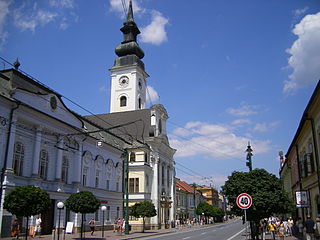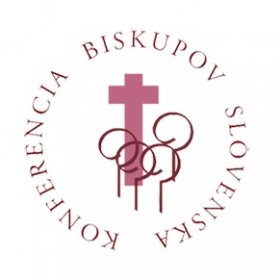External links
| | This organization-related article on the Catholic Church or a Catholic institution is a stub. You can help Wikipedia by expanding it. |
| Conferencia del Episcopado Mexicano | |
| Abbreviation | CEM |
|---|---|
| Headquarters | Calz. de los Misterios 26, Tepeyac Insurgentes, 07020 Ciudad de México, México |
President | Rogelio Cabrera López |
Vice President | Gustavo Rodríguez Vega |
| Website | www |
The Mexican Episcopal Conference (Spanish : Conferencia del Episcopado Mexicano) is an organization of Catholic bishops, known as an episcopal conference. It is the official leadership body of the Catholic Church in Mexico.
The organization is governed by the Presidency Council, consisting of:
The members of the CEM are all Diocesan Archbishops and Bishops, Eastern Rite Bishops, Diocesan Administrators and all those entitled to Diocesan Bishops, Coadjutors and Auxiliary Bishops and titular Bishops who carry out their functions within the Mexican territory, including the Apostolic Nuncio.
Currently, the bishops belonging to the CEM are classified as follows:
An apostolic administration in the Catholic Church is administrated by a prelate appointed by the pope to serve as the ordinary for a specific area. Either the area is not yet a diocese, or is a diocese, archdiocese, eparchy or similar permanent ordinariate that either has no bishop or archbishop or, in very rare cases, has an incapacitated (arch)bishop. The title also applies to an outgoing (arch)bishop while awaiting for the date of assuming his new position.
A coadjutor bishop is a bishop in the Latin Catholic, Anglican and (historically) Eastern Orthodox churches whose main role is to assist the diocesan bishop in administering the diocese.
The hierarchy of the Catholic Church consists of its bishops, priests, and deacons. In the ecclesiological sense of the term, "hierarchy" strictly means the "holy ordering" of the church, the Body of Christ, so to respect the diversity of gifts and ministries necessary for genuine unity.
In the Catholic Church, an apostolic visitor is a papal representative with a transient mission to perform a canonical visitation of relatively short duration. The visitor is deputed to investigate a special circumstance in a diocese or country, and to submit a report to the Holy See at the conclusion of the investigation.
The Argentine Episcopal Conference is an episcopal conference of the Roman Catholic Church of Argentina that gathers the bishops of the country in order to discuss pastoral issues and in general all matters that have to do with the Church. The following are members of the Conference:

In the Catholic Church, a bishop is an ordained minister who holds the fullness of the sacrament of holy orders and is responsible for teaching doctrine, governing Catholics in his jurisdiction, sanctifying the world and representing the Church. Catholics trace the origins of the office of bishop to the apostles, who it is believed were endowed with a special charism and office by the Holy Spirit at Pentecost. Catholics believe this special charism and office has been transmitted through an unbroken succession of bishops by the laying on of hands in the sacrament of holy orders.

The Ethiopian Catholic Archeparchy of Addis Abeba, officially the Metropolitan sui iuris Archeparchy of Addis Abeba is the metropolitan see of the Ethiopian Catholic Church, a sui iuris metropolitan Eastern Catholic Church.

The Antilles Episcopal Conference (AEC) is a Roman Catholic episcopal conference. Its members are bishops and archbishops from current and former British, Dutch, and French colonies and dependencies in the Caribbean, Central America, and northern South America. The conference's membership includes five archdioceses, fourteen dioceses, and two missions sui iuris. These particular Churches minister to Catholics in thirteen independent nations, six British Overseas Territories, three departments of France, three countries of the Kingdom of the Netherlands and 3 municipalities of the Netherlands proper.
The Diocese of Pinsk is a Latin Church ecclesiastical territory or diocese in Belarus. It is a suffragan diocese in the ecclesiastical province of the metropolitan Archdiocese of Minsk-Mohilev.

The Archeparchy of Prešov is an archeparchy of the Slovak Greek Catholic Church which is an Eastern Catholic particular church of the Catholic Church that is in full communion with the Holy See. The archeparchy is the metropolitan see of the Slovak Greek Catholic ecclesiastical province which covers the whole of Slovakia. The archeparch is also, ex officio, the metropolitan bishop of the metropolis. The geographical remit of the archeparchy itself is confined to the Prešov Region of Slovakia. The archeparch is currently Jonáš Maxim. The cathedral church of the archeparcy is the cathedral of St. John the Baptist which is situated in Prešov. As an Eastern Catholic church, it uses the Byzantine Rite in the Slovak and Church Slavonic languages.
Precedence signifies the right to enjoy a prerogative of honor before other persons; for example, to have the most distinguished place in a procession, a ceremony, or an assembly, to have the right to express an opinion, cast a vote, or append a signature before others, to perform the most honorable offices.
This is a glossary of terms used within the Catholic Church. Some terms used in everyday English have a different meaning in the context of the Catholic faith, including brother, confession, confirmation, exemption, faithful, father, ordinary, religious, sister, venerable, and vow.

The Conference of Bishops of Slovakia (KBS), was established on 23 March 1993, and is composed of the Catholic bishops in active service in the Slovak Republic.

The Spanish Episcopal Conference is an administrative institution composed of all the bishops of the dioceses of Spain and Andorra, in communion with the Roman Pontiff and under his authority. Its purpose is the joint exercise certain pastoral functions of the episcopate on the faithful of their territory, under common law and statutes, in order to promote the life of the Church, to strengthen its mission of evangelization and respond more effectively to the greater good that the Church should seek to men.

The Bishops' Conference of the Netherlands is a permanent body within the Roman Catholic Church in the Netherlands which determines policies and directs the apostolic mission within the Netherlands. It is governed by bishops from around the country.
Cabarsussi was an ancient civitas (municipality) and bishopric in the Roman province of Byzacena, that is tentatively identifiable with ruins at Drâa-Bellouan in modern Tunisia. The current bishop is Terence Robert Curtin, auxiliary bishop of Melbourne.
Jaime Calderón Calderón is a Mexican philosopher and cleric who served as Auxiliary Bishop of the Diocese of Zamora. On July 7, 2018, he was appointed by Pope Francis as Bishop of the Diocese of Tapachula. On July 4, 2024, he was appointed archbishop of the Archdiocese of León. He is also currently vice president of the Mexican Episcopal Conference for the three-year period 2024-2027, Conferencia del Episcopado Mexicano (C.E.M.)